Computer Science Professor Suman Jana Wins NSF Career Award
Jana’s proposal aims to improve security, reliability and robustness of infrastructure software.
Jana’s proposal aims to improve security, reliability and robustness of infrastructure software.
Ray seeks to improve the reliability of deep-learning applications used in safety-critical systems such as autonomous cars, medical diagnosis and malware detection.
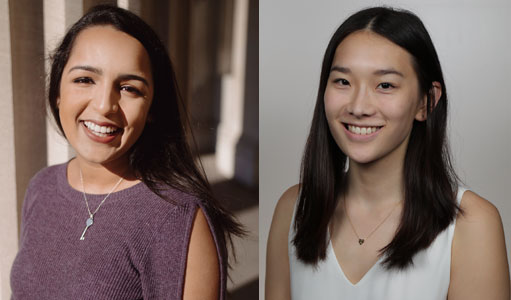
CompilHer is an educational technology podcast with the aim of encouraging high school girls to pursue computer science in college and beyond. The podcast is produced by computer science majors Surbhi Lohia (BC ’19) and Madeline Wu (BC ’19).
The interviews consist of women from various backgrounds who are involved in computer science and technology. Topics covered range from how to get started with computer science, what it’s like to be a CS major, to how to land an internship or job in the tech industry. Check out the podcast at https://anchor.fm/compilher or on Spotify.
There will be a Launch Party on Friday, April 26th from 2PM to 4PM at the CSC Student Lounge (5th floor) in the Milstein Center on Barnard’s campus. Everyone is invited to come network and mingle with the podcast’s guests and other CS and technology clubs from the Columbia community. (Event details here.)
Below is a Q&A with one of the producers, Madeline Wu:
Why produce this type of podcast on women in CS?
We knew that interest in computer science drops most drastically for girls in high school and wanted to find a creative solution to target that pain point. We also noticed that most existing podcasts about women in tech are about women who are already in the tech field, and thus wouldn’t be as relatable for a high school audience with limited CS experience.
Is this a class assignment or a personal project?
This project was done as a senior social action project through the Athena Scholars Program at Barnard. We’re happy to have chosen a project that is both personal and impactful!
Will you be producing more episodes?
We are currently wrapping up Season 1 in New York City. After graduation, we’ll be located in Seattle and NYC so we have yet to determine the future of CompilHER but want to make it work!
How did you choose your interviewees?
We wanted to choose relatable, yet aspirational role models for our target demographic of high school girls. We decided to tap into our own community of CS at Columbia and interview senior CS women about their experiences. We also tried to encompass a diverse range of backgrounds, experiences, and interests within tech.
What was the most surprising thing you’ve learned from your interviews?
You are never too young or inexperienced to make an impact! By starting small and learning how to ask, our podcast guests have been able to accomplish so much and receive the support they needed along the way!
If there’s one takeaway you want people to have, what is it?
We want high school girls to know that CS is for everyone, and that there is a whole community of amazing women in tech out there who want to support each other!
Learn the science behind movie magic in this talk with Nora Wixom BC’13, a visual effects director at Lucasfilm. Nora will be talking about the technology used to create the computer graphics and visual effects of movies. Nora has worked as a technical director on films such as Jurassic World, Captain America: Civil War, and Star Wars: Episode 8. Nora graduated from Barnard in 2013 with a degree in Computer Science, with a focus on Vision and Graphics.
The computer science department adds two more faculty members. With research and teaching experience in algorithmic game theory, machine learning, and computational genomics, these new CS faculty are facilitating research and learning in their respective computer science fields.
Tim Roughgarden
Professor, Computer Science
Postdoctoral researcher, UC Berkeley, (2004)
PhD Computer Science, Cornell University, (2002)
MS Mathematics, Cornell University, (2002)
MS Computer Science, Stanford University (1998)
BS Applied Mathematics, Stanford University (1997)
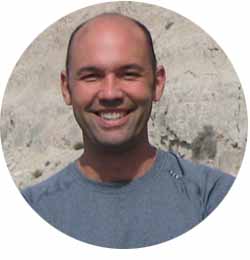
Tim Roughgarden works on algorithmic game theory and on the design, analysis, applications, and limitations of algorithms. He comes to Columbia from Stanford University, where he was a computer science professor for 15 years.
Much of his recent research explores the intersection of computer science and economics, with applications ranging from network routing to online advertising to spectrum auctions. Looking at economics through the computer science lens motivated a number of new questions that had gone unasked, shared Roughgarden. Some topics he has worked on include the price of anarchy (that is, approximation guarantees for game-theoretic equilibria), auction and mechanism design theory, and social network analysis. Other subjects that are on his radar are contract theory and blockchains.
In the fall Roughgarden will teach a randomized algorithms course, as well as an undergrad class on the intersection of computer science and economics that will cover everything from cryptocurrencies, auctions for advertising, and routing protocols. He is toying with the idea of a more advanced class on the foundations of blockchain technology with a particular emphasis on game theory.
He is in the midst of building up his research group, and has one new PhD student and one new postdoc arriving in the fall.
David Knowles
Assistant Professor, Computer Science
Core Faculty Member, New York Genome Center
Postdoctoral researcher, Stanford University (2018)
PhD Machine Learning, University of Cambridge, (2012)
MSc Bioinformatics and Systems Biology, Imperial College London (2008)
MEng Engineering, University of Cambridge (2007)
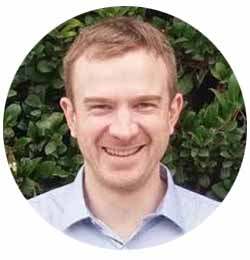
David A Knowles holds a joint appointment as a core faculty member at the New York Genome Center.
Knowles’ interests lie in the interface between Bayesian inference and machine learning. While at his postdoc at Stanford a lot of the work he did applied Bayesian statistical techniques in computational genomics.
Part of his research looked at questions around how genetic differences between people influence their disease risk. One study examined how chemotherapy patients could be sensitive to treatment depending on their genetic makeup, in terms of cardiac side effects. Knowles is also interested in various neurological diseases – ALS, autism, Alzheimer’s – and how to study these diseases using patients’ genetic data and patient-derived model systems such as induced neurons and organoids.
“There is some work in this area, but I think it is particularly important in biology where you want to understand how much uncertainty there is in the model and in your predictions because (like with the chemotherapy and cardiac side effects research) we want to know how certain we are that the patient will have a cardiac side effect if given a chemotherapy drug,” shared Knowles.
In the fall he will teach a class on how modern machine learning is used in genomics. The Knowles Lab opened in January and is looking for grad and postdocs. Postdocs have the option to work in the wet lab and computational side.
The Distinguished Lecture series brings computer scientists to Columbia to discuss current issues and research that is affecting their particular fields. This year, nine experts covered topics from deep learning, virtual reality, blockchains, algorithms, computing, and data science.
John Hennessy, from Stanford University, addressed the slower rate of performance growth for general processors and how he sees domain specific architectures may be the one attractive path for important classes of problems.
Below is the list of prominent faculty and industry researchers from across the country that gave talks and links to videos of their lectures.
Drinea, a lecturer in discipline of computer science, will receive this year’s Distinguished Faculty Teaching Award, an honor given annually by the Columbia Engineering Alumni Association. She’ll receive the award on Class Day, the May 20 commencement for Columbia Engineering graduates.
Looking around corners is one of the most dangerous parts of war for infantry. Ravn builds heads-up displays that let soldiers and law enforcement see around corners thanks to cameras on their gun, drones or elsewhere.
Hundreds joined DevFest for a week of workshops that ended with an 18-hour hackathon. In its ninth year, the event gathered technologists from the New York City area. The hackathon had a record 26 projects from teams across the Columbia community.
The iOs app SpineAlign took first place. The team, composed of first-year students, wanted to help people determine if they have scoliosis. The app hopes to be a resource that can help reduce the cost of diagnosis and increase accessibility for patients.
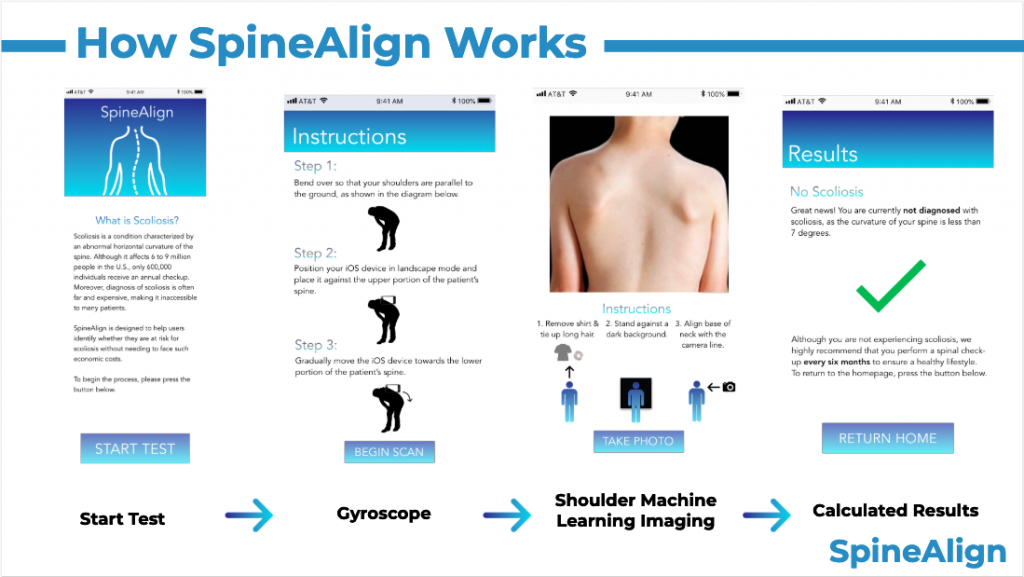
Second place went to PicCode, an app that can help verify code by simply taking a picture. Whiteboarding, coding by hand, and reading code in the form of physical text (via textbook or otherwise) is a common practice among programmers and CS students. PicCode enables users to take a picture of code and receive a return text that either contains the output of the code or any errors in the code.
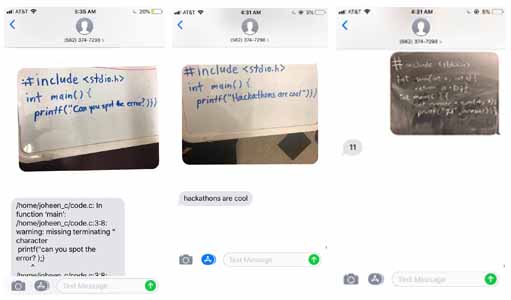
The ethos of the hackathon is you can go from zero to a working product in a very short amount of time, shared Christopher Thomas (GS ’19), the lead organizer from the Application Development Initiative (ADI). He continued, “I was a huge fan of EZPZ, an app that helps refugees fill out paperwork, they knocked it out of the park.”
Thomas and the ADI team started planning the event a year in advance to put together the four days of workshops, panels, and talks from industry professionals. “We made sure DevFest is a place where people can meet, learn together, and pick up coding skills,” he said.
List of winners
First place
Spine Align – Havi Nguyen, Annie Sui, Luvena Huo, James Wang
Second place
PicCode – Alexander Wang, Ursula Ott, Joheen Chakraborty, Michael Jan
Third place
Teach & Reach – Wu Shaun Khoo, Santoshi Ganesan
Bloomberg
Award of Excellence
EZPZ – Tomer Aharoni, Alon Ezer, Jonathan Bofman, Eden Dolev
Best
Beginner Hack
Delta – Kate Majidzadeh, Sofía Sánchez-Zárate, Benjamin Snyder, Carl Dobrovic
Best
Hack for Social Good
WeServe – Christopher Kang, Katharyn Fatehi, Naviya Makhija
Best
Financial Hack
Juvo – Rohan Macherla, Jack Shi, William Tong, Justing Won
Best
Hack for Sustainability
Hungry Hippos – Samantha Figueredo, Ailene Torres, Fernando Sanchez, Kimberly Mangual
Best
Use of Facebook Mission
Uberlytics – Kanishk Vashisht, Rahul Kataria, Sambhav Anand
Best
Educational Hack
League of Learners – Naledi Kekana, Nelson Lai, Yvette Zhang, Kailing Chen
Best Use of Google Cloud Platform
Sumy – William Zheng, Stan Liao, Sian Lee Kitt
Best
Use of Twilio API
LionDine – Jake Fisher, Paul Cassoulat, Sergio Llamas, Bryce Monier
Find open faculty positions here.
President Bollinger announced that Columbia University along with many other academic institutions (sixteen, including all Ivy League universities) filed an amicus brief in the U.S. District Court for the Eastern District of New York challenging the Executive Order regarding immigrants from seven designated countries and refugees. Among other things, the brief asserts that “safety and security concerns can be addressed in a manner that is consistent with the values America has always stood for, including the free flow of ideas and people across borders and the welcoming of immigrants to our universities.”
This recent action provides a moment for us to collectively reflect on our community within Columbia Engineering and the importance of our commitment to maintaining an open and welcoming community for all students, faculty, researchers and administrative staff. As a School of Engineering and Applied Science, we are fortunate to attract students and faculty from diverse backgrounds, from across the country, and from around the world. It is a great benefit to be able to gather engineers and scientists of so many different perspectives and talents – all with a commitment to learning, a focus on pushing the frontiers of knowledge and discovery, and with a passion for translating our work to impact humanity.
I am proud of our community, and wish to take this opportunity to reinforce our collective commitment to maintaining an open and collegial environment. We are fortunate to have the privilege to learn from one another, and to study, work, and live together in such a dynamic and vibrant place as Columbia.
Sincerely,
Mary C. Boyce
Dean of Engineering
Morris A. and Alma Schapiro Professor